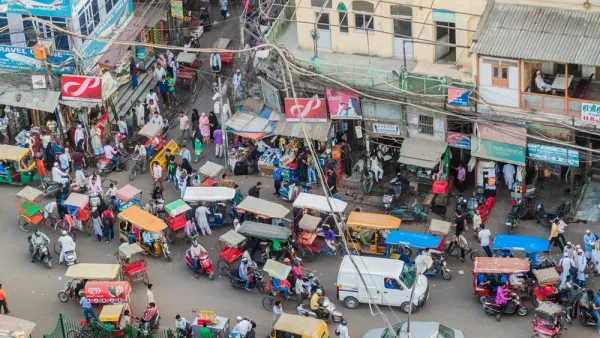Contrary to popular belief, Beijing's air pollution is not nearly the worst in the world. The air of Delhi, India, is twice as polluted. For expats, this disaster raises important questions: is it ethical to live, and raise children, in India?

In the United States, it's becoming increasingly hard to appreciate the dangers of air pollution. Though work remains to be done, American cities and industries have managed to reduce exhaust through a variety of methods, some of which are considered expensive but which environmentalists consider good investments. To see the benefits of those investments, one needs only look, tragically, to India, whose cities have some of the worst pollution in the world.
In an op-ed, New York Times correspondent Gardinier Harris makes this tragedy personal. While Indian citizens may have no choice but to suffer in dirty air, expatriates face a choice of whether to live in India or not. Harris, who lived in Delhi, argues that the dangers posed by air pollution increasingly make this not just a lifestyle choice but in fact a moral choice, with his children's lives literally at stake.
"Delhi’s true menace came from its air, water, food and flies. These perils sicken, disable and kill millions in India annually, making for one of the worst public health disasters in the world. Delhi, we discovered, is quietly suffering from a dire pediatric respiratory crisis, with a recent study showing that nearly half of the city’s 4.4 million schoolchildren have irreversible lung damage from the poisonous air."
"Foreigners have lived in Delhi for centuries, of course, but the air and the mounting research into its effects have become so frightening that some feel it is unethical for those who have a choice to willingly raise children here. Similar discussions are doubtless underway in Beijing and other Asian megacities, but it is in Delhi — among the most populous, polluted, unsanitary and bacterially unsafe cities on earth — where the new calculus seems most urgent.
"Sarath Guttikunda, one of India’s top pollution researchers, who moved to Goa, on the west coast of India, to protect his two young children, was unequivocal: 'If you have the option to live elsewhere, you should not raise children in Delhi.'....And then there are nascent areas of research suggesting that pollution can lower children’s I.Q., hurt their test scores and increase the risks of autism, epilepsy, diabetes and even adult-onset diseases like multiple sclerosis."
FULL STORY: Holding Your Breath in India

Analysis: Cybertruck Fatality Rate Far Exceeds That of Ford Pinto
The Tesla Cybertruck was recalled seven times last year.

National Parks Layoffs Will Cause Communities to Lose Billions
Thousands of essential park workers were laid off this week, just before the busy spring break season.

Retro-silient?: America’s First “Eco-burb,” The Woodlands Turns 50
A master-planned community north of Houston offers lessons on green infrastructure and resilient design, but falls short of its founder’s lofty affordability and walkability goals.

Test News Post 1
This is a summary

Analysis: Cybertruck Fatality Rate Far Exceeds That of Ford Pinto
The Tesla Cybertruck was recalled seven times last year.

Test News Headline 46
Test for the image on the front page.
Urban Design for Planners 1: Software Tools
This six-course series explores essential urban design concepts using open source software and equips planners with the tools they need to participate fully in the urban design process.
Planning for Universal Design
Learn the tools for implementing Universal Design in planning regulations.
EMC Planning Group, Inc.
Planetizen
Planetizen
Mpact (formerly Rail~Volution)
Great Falls Development Authority, Inc.
HUDs Office of Policy Development and Research
NYU Wagner Graduate School of Public Service


























